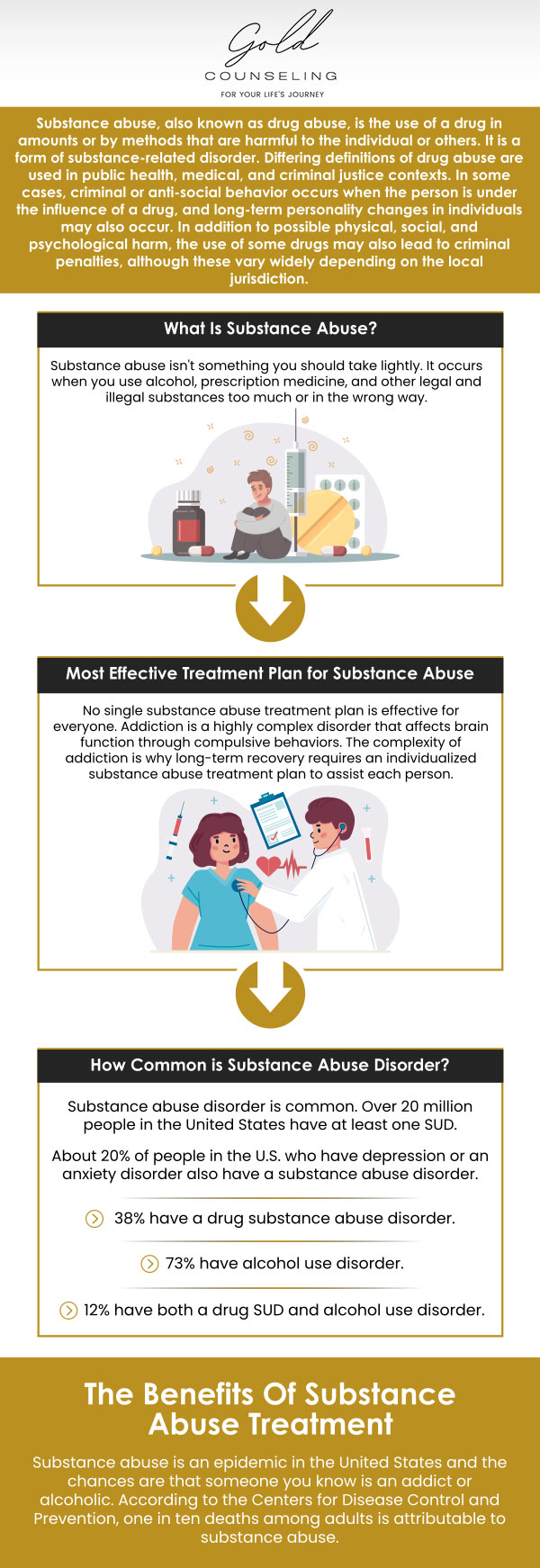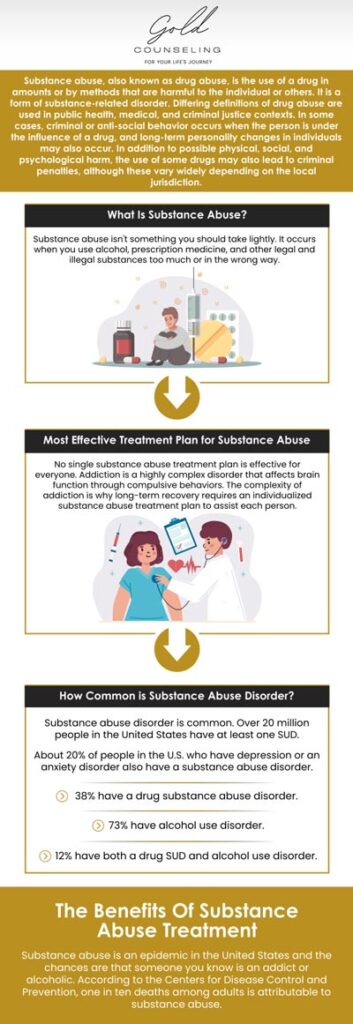Substance Abuse Support Therapy Q&A
Substance abuse can be a challenging battle, but you don’t have to face it alone. At Gold Counseling, our dedicated team of therapists is committed to providing compassionate and evidence-based substance abuse support therapy. Through personalized treatment plans, we empower individuals to overcome addiction, heal from past traumas, and build a brighter future. For more information, contact us or book an appointment online. We have convenient locations to serve you in Riverdale, Kaysville, Draper, and St. George UT.




Table of Contents:
What are some examples of substance abuse?
What is typically the first step in the substance abuse treatment process?
What are three options for substance abuse treatment?
What is the psychological treatment for substance abuse?
At Gold Counseling, we understand the complexity and severity of substance abuse. It is a widespread issue that manifests in many forms, each carrying its serious health consequences. We often encounter cases of alcoholism, illicit drug use, tobacco addiction, inhalant abuse, and misuse of over-the-counter drugs.
Alcoholism, one of the most common forms of substance abuse, is a chronic illness marked by excessive drinking and an alcohol fixation. The health complications from this can be devastating, leading to conditions like liver disease, cardiovascular disease, and even cancer.
Another common issue is the misuse of illicit drugs. This category not only includes illegal drugs like marijuana, cocaine, heroin, and methamphetamine, but also the misuse of prescription medications like opioids, sedatives, and stimulants. This misuse is a significant public health concern, and we’re here to help.
Tobacco use is an often overlooked form of substance abuse. Nicotine is highly addictive, making it very difficult for individuals to quit, and it is the primary cause of preventable death worldwide.
Inhalant abuse is a less common but equally harmful form of substance abuse. Inhalants have the potential to seriously harm the brain and other vital organs, and it’s important to seek help immediately if this is a problem for you or someone you know.
Finally, we see individuals misusing over-the-counter drugs by taking them in higher doses than recommended, using them for purposes not intended by the manufacturer, or mixing them with other drugs or alcohol. Serious health effects from this practice include overdosing and even death.
Our initial step in the substance abuse treatment process, often referred to as intake or assessment, is a critical stage. Our healthcare professionals, specifically trained in addiction medicine, carry out a comprehensive evaluation of the patient. This evaluation comprises a thorough analysis of the patient’s physical, psychological, and social condition, along with their history of substance use.
During this stage, our team gathers crucial information about the nature and severity of the patient’s substance use. We consider factors such as the type of substances used, the duration and pattern of use, and any previous attempts at treatment. This information helps us to determine the level of physical dependence or addiction and to understand the impact of substance use on the individual’s life.
We also evaluate the patient’s overall health status, which may involve physical examinations, laboratory tests, and other diagnostic procedures. We aim to identify any co-existing medical conditions, such as liver disease, heart disease, or mental health disorders, which may complicate the treatment process or require additional medical intervention.
The initial stage in addressing substance use disorders frequently entails detoxification. Detoxification aims to facilitate the safe withdrawal from substances of abuse under medical supervision. This procedure helps to control the symptoms of withdrawal, reduce the possibility of consequences, and guarantee the patient’s comfort and safety.
We understand the gravity of substance abuse and the urgent need for effective treatment. Our medical practice offers three primary options for those seeking help: residential treatment programs, outpatient therapy, and medication-assisted treatment.
1. Residential Treatment Programs (Inpatient Rehabilitation):
Our residential treatment program involves patients residing at our treatment facility for a specified duration, usually 30, 60, or 90 days. We provide a structured environment with round-the-clock supervision and support. Our program includes intensive therapy, medical monitoring, and group counseling sessions, making it an ideal choice for individuals with severe addictions and those with co-occurring mental health conditions.
2. Outpatient Therapy (Outpatient Programs):
People can live at home while undergoing treatment at our facility thanks to our outpatient services. We offer therapy sessions at our clinic, enabling individuals to balance their daily responsibilities like work and family commitments. Our therapy focuses on changing thoughts and behaviors and addressing underlying issues contributing to substance abuse. The intensity of our outpatient programs varies, ranging from daily intensive sessions to less frequent weekly meetings.
3. Medication-Assisted Treatment (MAT):
The initial step of many treatment plans often involves detoxification. This process is essential for managing withdrawal symptoms when a patient stops using the substance they are addicted to. Our MAT combines behavioral therapy with medications to manage withdrawal symptoms and cravings. The effects of alcohol and opioids are lessened by medications like naltrexone, buprenorphine, and methadone. Our MAT serves as a bridge to recovery, reducing the risk of relapse and overdose.
Every one of these choices has special benefits of its own and is more or less suitable depending on the individual’s circumstances. We recommend consulting with our healthcare professionals or addiction specialists who can guide you or your loved one towards the most appropriate treatment.
We provide comprehensive psychological services for substance abuse, understanding that each individual’s journey to recovery is unique. Our experienced and compassionate team of professionals utilizes a variety of therapeutic approaches, making certain that each treatment plan is customized to the unique requirements and circumstances of the client.
Our practice frequently employs Cognitive Behavioral Therapy (CBT), a proven method for addressing the negative thoughts, beliefs, and behaviors associated with substance misuse. Through CBT, our clients learn to identify triggers, develop effective coping strategies, improve problem-solving skills, and bolster their self-esteem.
We also offer Dialectical Behavior Therapy (DBT), a skills-based therapy focusing on emotional regulation, distress tolerance, and interpersonal relationship enhancement. DBT techniques foster mindfulness, improve distress tolerance strategies, and enhance communication skills.
Recognizing the impact of substance abuse on families, we incorporate family therapy into our treatment plans, particularly for adolescent clients. We involve family members in the treatment process, working towards improved communication, addressing underlying family dynamics, and providing assistance to the person and those close to them.
We also conduct group therapy sessions, which offer a secure and encouraging setting for people to talk about their experiences, pick up tips from others, and develop new coping skills. This strategy lessens the stigma attached to substance usage while promoting a sense of community.
At Gold Counseling, our goal is not just to treat substance abuse but to empower our clients towards a healthier life. For more information, contact us or book an appointment online. We serve patients from Riverdale UT, Washington Terrace UT, Clinton UT, Kaysville UT, Clearfield UT, Farmington UT, Draper UT, Riverton UT, Sandy UT, St. George UT, Bloomington UT, Santa Clara UT, and surrounding areas.
Check Out Our 5 Star Reviews



Additional Services You May Need
▸ Relationship Counselling
▸ Couples Counselling
▸ Individual Therapy
▸ EMDR Therapy
▸ Spiritual Healing
▸ Disordered Eating
▸ LGBTQIA+ Therapy
▸ Group Psychotherapy
▸ Life Coaching Therapist
▸ Depression Treatment
▸ Mental Health Clinic
▸ Life Transition Therapy
▸ Telehealth Counseling
▸ Cognitive Behavioral Therapy (CBT)
▸ Dialectic Behavioral Therapy (DBT)


